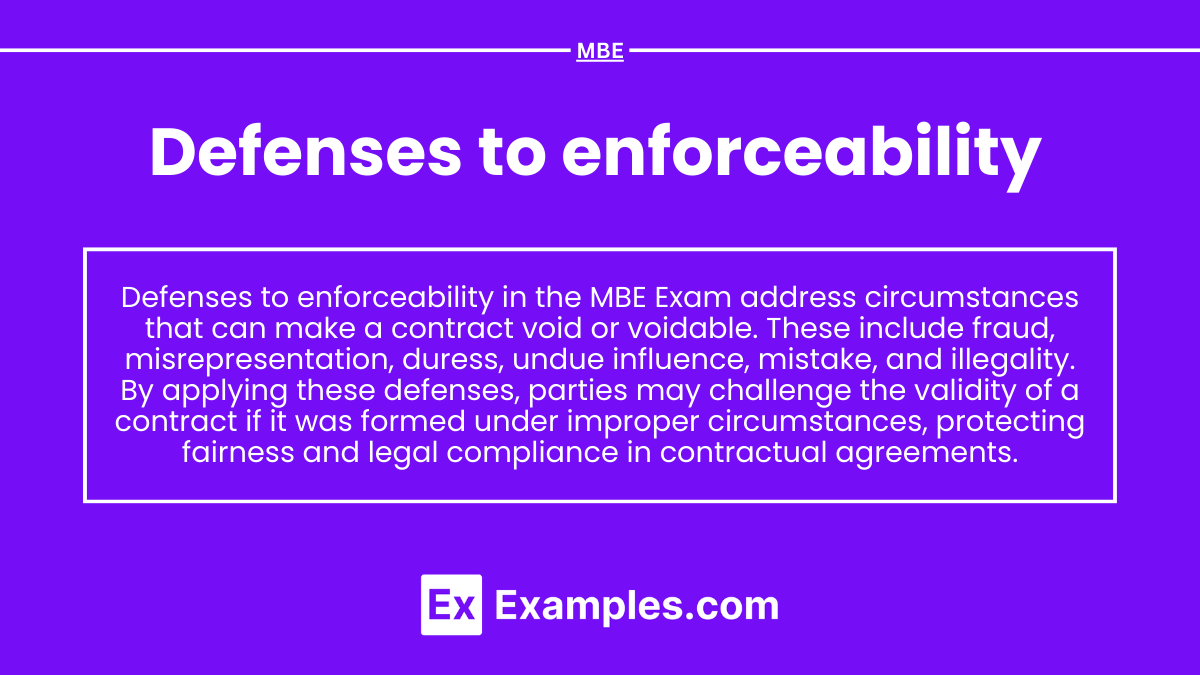Preparing for the MBE Exam requires a thorough understanding of defenses to enforceability in contracts, including fraud, misrepresentation, duress, undue influence, and illegality. Mastering these defenses is essential for evaluating when contracts may be voided or deemed unenforceable. This knowledge is critical for analyzing and applying contract law principles effectively.
Learning Objective
In studying “Defenses to Enforceability” for the MBE Exam, you should learn to identify and evaluate legal defenses that may render contracts voidable or unenforceable, including fraud, misrepresentation, duress, undue influence, mistake, and illegality. Analyze how each defense applies in specific scenarios, focusing on elements such as capacity, unconscionability, and public policy concerns. Explore how these defenses impact the validity and enforceability of contracts in legal disputes. Practice applying this knowledge through MBE questions to strengthen your legal reasoning and ability to assess enforceability issues effectively in contract law.
Fraud, Misrepresentation, and Concealment
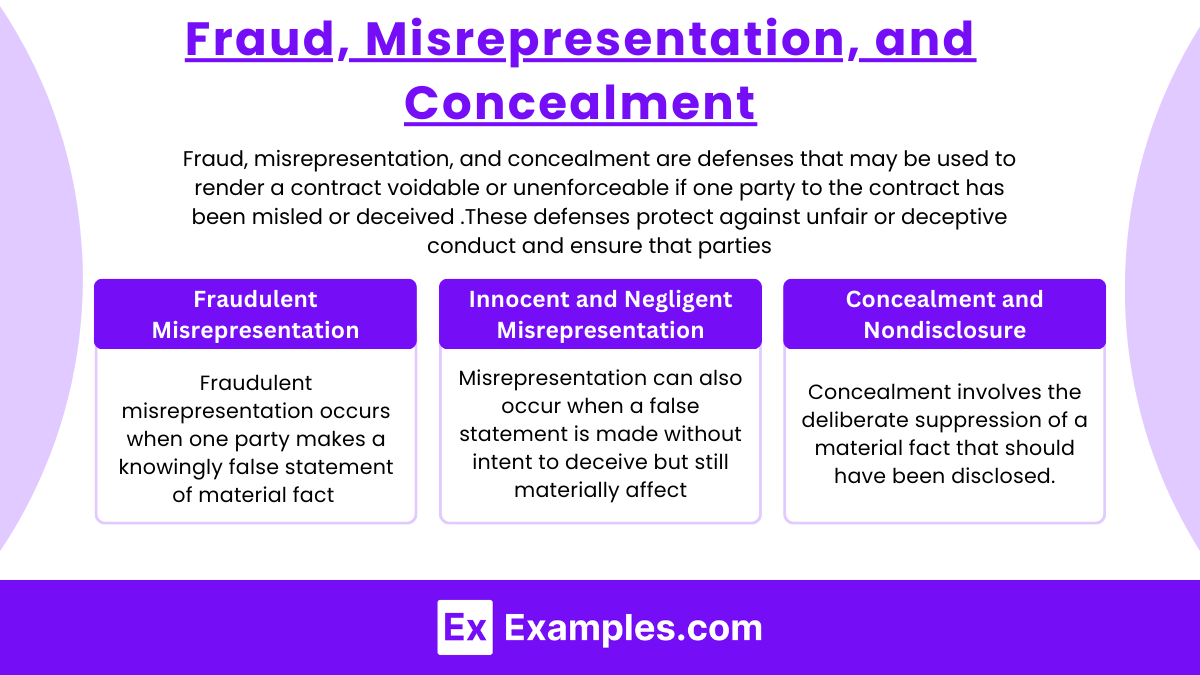
Fraud, misrepresentation, and concealment are defenses that may be used to render a contract voidable or unenforceable if one party to the contract has been misled or deceived. These defenses protect against unfair or deceptive conduct and ensure that parties enter into contracts with a full understanding of the terms and material facts.
- Fraudulent Misrepresentation
Fraudulent misrepresentation occurs when one party makes a knowingly false statement of material fact with the intent to deceive the other party, resulting in that party’s reliance on the misrepresentation and subsequent harm.- Elements of Fraudulent Misrepresentation:
- False Representation: A false statement of a material fact (not opinion or puffery) is made.
- Intent to Deceive (Scienter): The party making the statement must have knowledge of its falsity or show reckless disregard for the truth.
- Justifiable Reliance: The victim must have relied on the misrepresentation in a reasonable manner.
- Damages: The victim must have suffered harm or loss as a result of the reliance on the misrepresentation.
- Example: If a seller knowingly misrepresents the condition of a house by concealing major structural issues, and the buyer relies on this information to purchase the house, the buyer may have grounds to void the contract and seek damages.
- Elements of Fraudulent Misrepresentation:
- Innocent and Negligent Misrepresentation
Misrepresentation can also occur when a false statement is made without intent to deceive but still materially affects the other party’s decision to enter into the contract.- Innocent Misrepresentation: This occurs when a party makes a false statement of fact believing it to be true. The affected party may rescind the contract but cannot seek damages since there was no intent to deceive.
- Negligent Misrepresentation: This occurs when a party makes a false statement because they failed to exercise reasonable care in verifying its truth. In this case, the party providing the information may be liable for damages.
- Example: If a seller mistakenly, but without intent to deceive, states that a piece of equipment is new when it has actually been used, the buyer may void the contract due to innocent or negligent misrepresentation.
- Concealment and Nondisclosure
Concealment involves the deliberate suppression of a material fact that should have been disclosed. Unlike misrepresentation, which involves affirmative false statements, concealment is about hiding the truth.- Intentional Concealment: If a party actively hides a material fact that affects the terms of the contract (e.g., covering up mold in a home being sold), it can be considered fraudulent concealment.
- Nondisclosure: In some situations, mere nondisclosure (failing to disclose a fact) may also be grounds for rendering a contract voidable if there is a duty to disclose. Such a duty may arise from a fiduciary relationship, statutory requirements, or the importance of the undisclosed fact to the contract.
- Example: If a used car dealer fails to disclose that a car has been in a major accident, the buyer may be able to void the contract based on concealment or nondisclosure.
Remedies for Fraud, Misrepresentation, and Concealment
Victims of fraud, misrepresentation, or concealment can seek various remedies, including:
- Rescission: The contract is voided, and the parties are returned to their pre-contract positions.
- Damages: The injured party may seek compensatory damages to cover losses incurred due to the misrepresentation. In cases of fraud, punitive damages may also be awarded to punish the wrongdoer.
Duress and Undue Influence
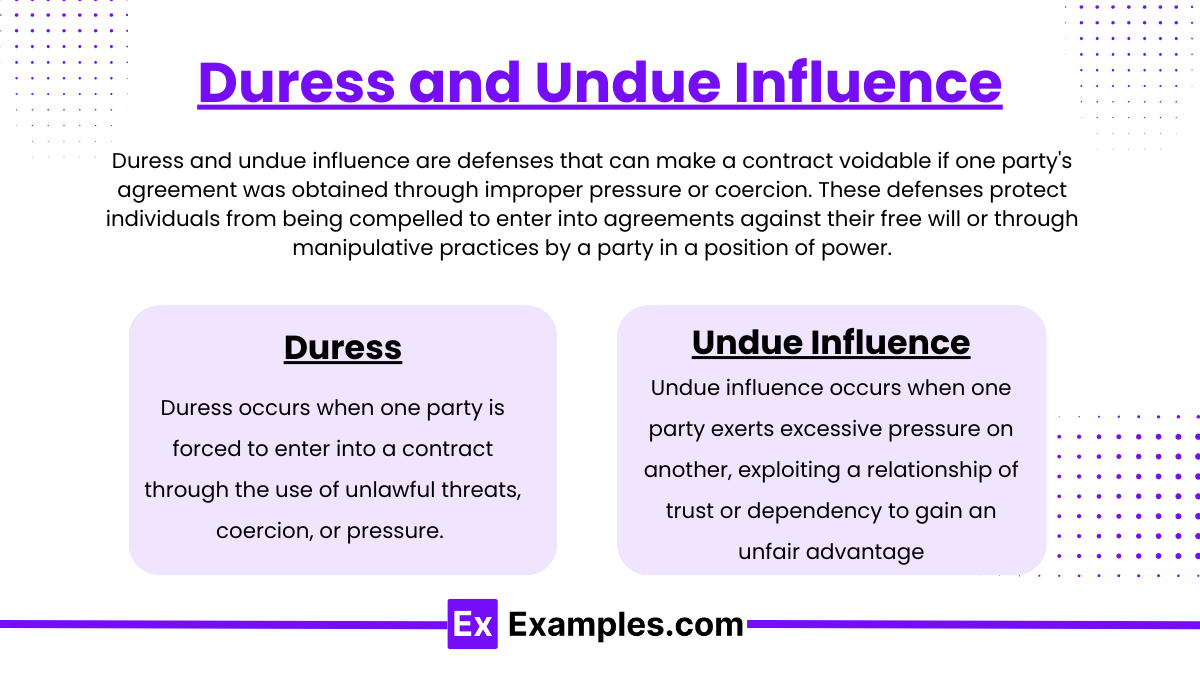
Duress and undue influence are defenses that can make a contract voidable if one party’s agreement was obtained through improper pressure or coercion. These defenses protect individuals from being compelled to enter into agreements against their free will or through manipulative practices by a party in a position of power.
- Duress
Duress occurs when one party is forced to enter into a contract through the use of unlawful threats, coercion, or pressure. The key issue is whether the party’s free will was overborne by the conduct of the other party. If a contract is entered into under duress, it can be voidable by the victimized party. There are different forms of duress, including:- Physical Duress: This involves threats of physical harm to the party or their loved ones. If a person is forced to sign a contract under threat of physical violence, the contract is not enforceable.
- Economic Duress (Business Compulsion): Economic duress occurs when one party is forced to agree to a contract due to wrongful threats affecting their financial interests. Examples include threats to breach a contract, withhold goods or services, or take actions that would cause significant financial harm unless the other party agrees to the terms.
- Legal Duress: This form involves using threats of legal action or litigation to coerce agreement when such threats are made without legal justification.
- Improper Threat: The threat must be unlawful or improper and leave the victim with no reasonable alternative but to agree.
- Involuntary Consent: The party must have been forced to agree under threat, making their consent involuntary.
- Causation: The duress must have been a direct cause of the party entering into the contract.
- Undue Influence
Undue influence occurs when one party exerts excessive pressure on another, exploiting a relationship of trust or dependency to gain an unfair advantage. It is a form of coercion that often arises in relationships where one party holds power or authority over the other, such as between a caregiver and an elderly person, an attorney and a client, or a guardian and a ward.- Key Characteristics:
- Relationship of Trust and Confidence: The influenced party must have been in a relationship of trust with the other party.
- Excessive or Unfair Pressure: The party in a position of influence must have used that influence to pressure the weaker party to enter into a contract that benefits the influencer.
- Unfair Outcome: The result of the undue influence must have led to an unfair advantage or benefit for the dominant party.
- The vulnerability of the influenced party (e.g., age, mental capacity).
- The degree of authority or trust held by the dominant party.
- The existence of coercive or manipulative tactics used by the dominant party.
- The terms of the agreement, which may indicate an unfair result.
- Key Characteristics:
Remedies for Duress and Undue Influence
Contracts entered into under duress or undue influence can be voided or rescinded, returning the parties to their original positions. Courts may also award damages in cases where the victim suffered harm due to the improper conduct. The goal is to ensure that agreements are entered into freely and fairly, without coercion or exploitation.
Mistake in Contract Law
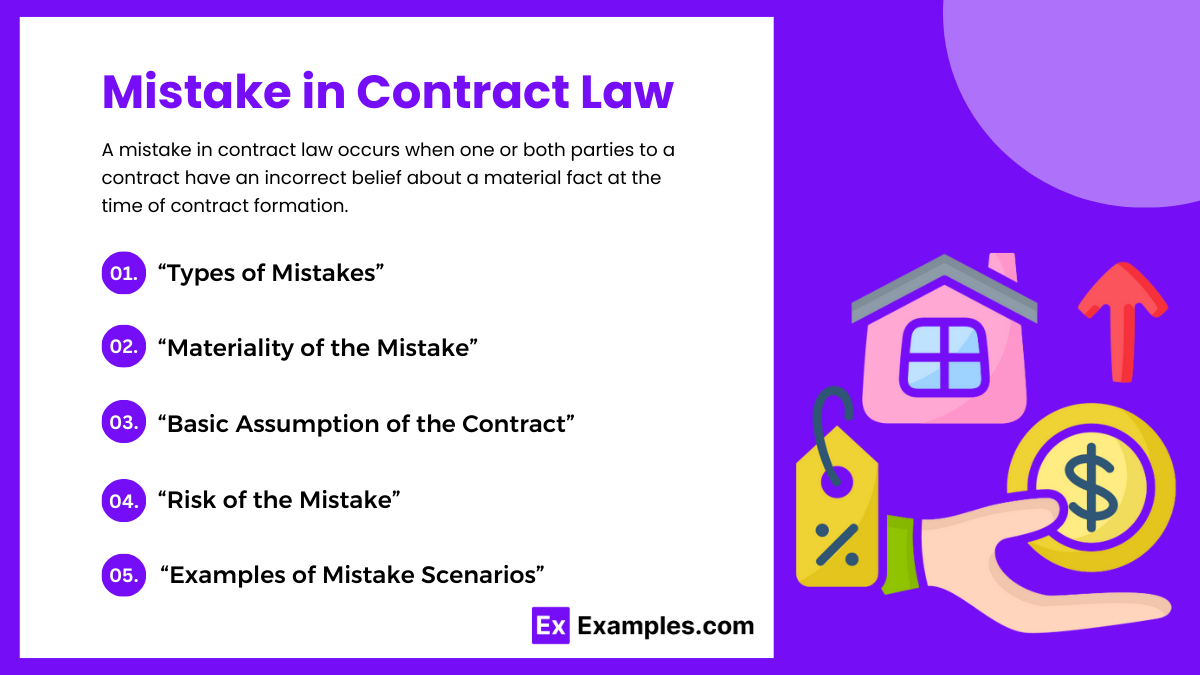
A mistake in contract law occurs when one or both parties to a contract have an incorrect belief about a material fact at the time of contract formation. If a mistake significantly impacts the terms or purpose of the contract, it can lead to rescission or make the contract voidable under certain conditions. Mistakes are categorized into unilateral and mutual mistakes, each with distinct legal implications. Here are five key points explaining mistake in detail:
- Types of Mistakes
- Unilateral Mistake: This occurs when only one party is mistaken about a material fact related to the contract. Generally, a unilateral mistake does not provide grounds for rescinding the contract unless certain conditions are met, such as when the other party knew or should have known about the mistake or when the mistake is so significant that enforcing the contract would be unconscionable.
- Mutual Mistake: This occurs when both parties have a shared but incorrect belief about a fundamental fact at the time of contract formation. Mutual mistakes often relate to the identity, nature, or existence of the subject matter and can render a contract voidable if the mistake materially affects the agreement’s purpose.
- Materiality of the Mistake
- For a mistake to be grounds for rescission or to make a contract voidable, it must be material. This means the mistake must have a significant impact on the agreed terms, performance, or value of the contract. A minor or trivial mistake is unlikely to affect the enforceability of the contract.
- Basic Assumption of the Contract
- A mistake must concern a basic assumption on which the contract was made. This means that the mistaken belief goes to the very heart of the agreement. For example, if both parties believe they are contracting for a rare artifact, but it turns out to be a replica, this could be a mutual mistake concerning a basic assumption.
- Risk of the Mistake
- If one party bears the risk of the mistake, they may be unable to void the contract. A party may assume the risk of a mistake through express agreement, awareness of limited knowledge, or circumstances that make it reasonable for that party to bear the risk. For instance, if a buyer agrees to purchase an item “as is,” they may be assuming the risk of any defects or unknown facts.
- Examples of Mistake Scenarios
- Mutual Mistake Example: Two parties enter into a contract for the sale of a parcel of land, both believing it contains valuable minerals. Later, it is discovered that no such minerals exist. Because both parties were mistaken about a fundamental aspect of the contract, it may be rescinded.
- Unilateral Mistake Example: A contractor submits a bid for a project based on incorrect calculations and realizes the error after the bid is accepted. The contract may only be voided if the other party knew or should have known of the mistake, or if enforcing it would lead to an unconscionable result.
Illegality and Public Policy Concerns in Contract Law
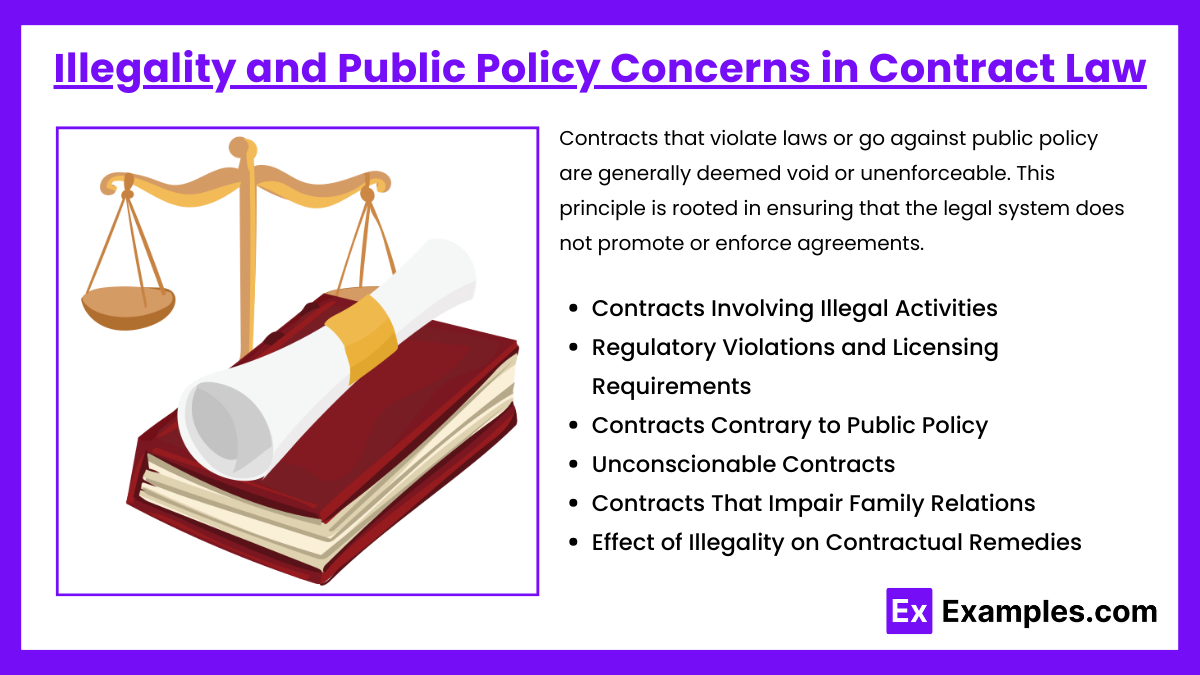
Contracts that violate laws or go against public policy are generally deemed void or unenforceable. This principle is rooted in ensuring that the legal system does not promote or enforce agreements that contravene statutes, moral standards, or societal interests. Here are six key points explaining illegality and public policy concerns in detail:
- Contracts Involving Illegal Activities
- Contracts that require or promote illegal acts are automatically void and unenforceable. Examples include agreements for the sale of illegal drugs, contracts to commit a crime, or arrangements that violate regulatory laws. The courts will not enforce such contracts to maintain public order and prevent illegal conduct.
- Example: A contract to smuggle contraband goods is void because it involves a criminal act, and neither party can seek legal enforcement or damages.
- Regulatory Violations and Licensing Requirements
- Contracts that violate regulatory statutes, such as licensing requirements, may be void if the regulation is intended to protect public health, safety, or welfare. For example, if a contractor performs work without the required license, the contract may be unenforceable depending on the purpose of the licensing law (e.g., consumer protection vs. revenue generation).
- Example: An unlicensed medical practitioner entering a contract to perform medical procedures may be barred from enforcing the contract due to public health concerns.
- Contracts Contrary to Public Policy
- Contracts that are not illegal per se but violate established public policy norms are considered void. Examples include contracts that unreasonably restrain trade, undermine public morals, or hinder justice.
- Examples of Public Policy Concerns:
- Restraint of Trade: Non-compete agreements that excessively restrict a former employee’s right to work may be unenforceable if they are unreasonable in scope, duration, or geographic area.
- Waiver of Liability for Gross Negligence: Contracts that seek to waive liability for grossly negligent or intentional acts are often unenforceable because they undermine public safety.
- Unconscionable Contracts
- A contract may be deemed unconscionable if it is so one-sided or oppressive that it shocks the conscience. Unconscionability has two components: procedural unconscionability (unfairness in the bargaining process) and substantive unconscionability (unfair or oppressive terms).
- Example: A contract containing excessively high interest rates or hidden terms in fine print that place an undue burden on one party may be considered unconscionable and unenforceable.
- Contracts That Impair Family Relations
- Contracts that interfere with family relationships or promote conduct contrary to societal norms may be unenforceable. This includes agreements that disrupt marriage, custody arrangements, or promote divorce.
- Example: A contract that provides financial incentives to one spouse for obtaining a divorce may be void as it promotes the dissolution of marriage.
- Effect of Illegality on Contractual Remedies
- When a contract is deemed illegal or against public policy, courts generally refuse to enforce the agreement or provide remedies to the parties involved. However, there may be exceptions where one party is less culpable (e.g., in pari delicto doctrine does not apply) or where a party seeks restitution to prevent unjust enrichment.
- Example: If one party has fully performed an illegal contract without knowing it was illegal, the court may grant limited relief to prevent unjust enrichment to the other party.
Examples
Example 1: Fraudulent Misrepresentation
A car dealer knowingly sells a vehicle with major engine problems but falsely represents it as being in perfect working condition. The buyer, relying on the dealer’s false statements, purchases the car. Since the misrepresentation was intentional and material, the buyer can void the contract and seek damages for fraudulent misrepresentation.
Example 2: Economic Duress
A supplier threatens to cut off essential raw material deliveries to a manufacturer unless the manufacturer agrees to a new, highly unfavorable contract. The manufacturer, facing the potential collapse of their business, agrees under pressure. This contract can be voided due to economic duress, as the agreement was coerced through improper threats.
Example 3: Undue Influence
A caregiver convinces an elderly client to sign over their property by using manipulation and exploiting the client’s trust and dependence. This contract may be voided due to undue influence since the caregiver exerted excessive and unfair pressure on the client in a position of vulnerability.
Example 4: Mutual Mistake
Two parties enter into a contract believing a parcel of land contains valuable mineral deposits. Later, it is discovered that no such minerals exist. Because both parties were mistaken about a fundamental fact central to the agreement, the contract may be rescinded based on mutual mistake.
Example 5: Illegality
A contractor agrees to construct a building but stipulates that certain environmental regulations must be violated during construction. The contract is void and unenforceable because it involves illegal conduct. Courts refuse to uphold agreements that contravene the law to protect public interests.
Practice Questions
Question 1
Which of the following is an example of economic duress that may make a contract voidable?
A) A buyer refusing to accept late delivery of goods.
B) A party signing an agreement under threat of physical harm.
C) A supplier threatening to cut off essential supplies unless a new contract is signed.
D) A party agreeing to contract terms they find unfavorable.
Answer: C) A supplier threatening to cut off essential supplies unless a new contract is signed.
Explanation: Economic duress occurs when one party is pressured into entering a contract due to unlawful or improper threats affecting their financial interests, with no reasonable alternatives available. In this case, the supplier’s threat to withhold essential supplies coerces the other party, potentially rendering the contract voidable.
Question 2
A contract may be voided due to undue influence if:
A) One party unknowingly signs a contract with errors.
B) One party is pressured by a trusted caregiver to sign away assets.
C) Both parties agree to illegal terms.
D) A party changes their mind after signing.
Answer: B) One party is pressured by a trusted caregiver to sign away assets.
Explanation: Undue influence occurs when one party uses excessive pressure or manipulates a position of trust to gain an unfair advantage over another. In this scenario, the trusted caregiver uses their relationship to pressure the other party, demonstrating undue influence and justifying rescission of the contract.
Question 3
Which of the following situations best illustrates a mutual mistake in contract formation?
A) One party misreads the contract terms.
B) Both parties believe a painting being sold is an original, but it is a replica.
C) One party is tricked into signing a contract through fraud.
D) One party agrees to terms without reading them.
Answer: B) Both parties believe a painting being sold is an original, but it is a replica.
Explanation: Mutual mistake occurs when both parties share an incorrect belief about a fundamental fact central to the contract. In this case, both parties mistakenly believe the painting is an original, significantly affecting the contract’s terms, and the contract may be voided based on mutual mistake.

